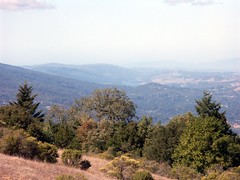 Here it is, the long awaited return to the topic of "uncertainty"! But we won't deal with technical details of feedbacks and models yet. Instead, let's approach it with discussion of a topic fundamental to much of human civilization--wine. The BBC ran a short story online yesterday that talked about the impact of climate change on the wine industry. The National Academy of Sciences of the US predicts that by the end of the century, 81% of current wine-producing regions worldwide could be affected negatively by climate change. Some of the negative impacts would be increasingly hot summers, extended periods of heat, and increasingly dry conditions. This is alarming for many premier regions, such as Spain, where things are expected to heat up in the not too distant future. Some regions, such as Bordeaux, could benefit on the short-term from a wee bit more consistency in their summers. But ultimately, prime growing conditions would shift north. Personally, I'm more of a single malt and beer lover. Wine lovers, please do not be offended; my definition of what constitutes good beer is exceedingly narrow, and as long grape production does not interfere with barley fields in Scotland, we'll have no issues with each other.
Here it is, the long awaited return to the topic of "uncertainty"! But we won't deal with technical details of feedbacks and models yet. Instead, let's approach it with discussion of a topic fundamental to much of human civilization--wine. The BBC ran a short story online yesterday that talked about the impact of climate change on the wine industry. The National Academy of Sciences of the US predicts that by the end of the century, 81% of current wine-producing regions worldwide could be affected negatively by climate change. Some of the negative impacts would be increasingly hot summers, extended periods of heat, and increasingly dry conditions. This is alarming for many premier regions, such as Spain, where things are expected to heat up in the not too distant future. Some regions, such as Bordeaux, could benefit on the short-term from a wee bit more consistency in their summers. But ultimately, prime growing conditions would shift north. Personally, I'm more of a single malt and beer lover. Wine lovers, please do not be offended; my definition of what constitutes good beer is exceedingly narrow, and as long grape production does not interfere with barley fields in Scotland, we'll have no issues with each other.
Anyway, what interested me most about the BBC's article were comments made by some growers right here in California's Napa Valley. The Valley is one of those places that is just perfectly suited to grape growing. The growers in the article, while acknowledging the growing threat of climate change, suggest that it could be beneficial for Napa, or that Napa will escape the worst of it. The reason, they claim, is that as inland California (the Central Valley) heats up, as it does this time of year, the rising hot air pulls in cool air from the cool Pacific Ocean. True; this morning in Berkeley was quite foggy and cool. Therefore, as things heat up this century, they expect more of this microclimate cooling.
The line of argument would be fine, if we lived in a poorly connected world without feedbacks, and we plan on the short-term. To understand this at the simplest level, consider that ocean temperature is increasing along with atmospheric temperature (albeit more slowly). The moderating and cooling effects of the coastal eastern Pacific will therefore diminish as ocean temperatures increase. Water and precipitation cycles will also change, since evaporation from the oceans, and tropical forests, are major players in atmospheric water movement. A more complicated feedback could involve potential changes in ocean circulation as the oceans warm, and there is less production of cold water in polar regions, the engines of global ocean circulation. The impacts here are less well understood, but probably will mean less productive coastal fisheries, changes in coastal climates and precipitation, and even desertification. The economic impacts on these important regions globally could result in greater consumption of premium beer (cheaper) and reduced wine consumption (pricier). It's all connected. Will there be any positive impacts of climate change? I keep looking for them, and there should be for some members of the natural world, but for most, I don't think so. And I really can't find many for humans. The Napa farmers do go on in the article to articulate their impressive conversions to organic farming, and great concern for global climate change in general. And, in the end, if more dust bowls produce more Steinbecks, that wouldn't be bad.
Powered by ScribeFire.